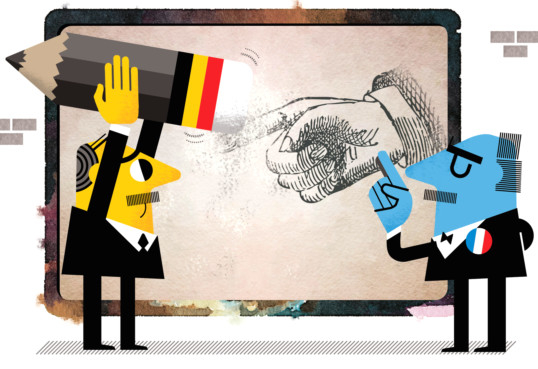
Belgium’s institutions, law enforcement agencies and social infrastructure were all criticised after the Brussels attacks. Some of this may have been warranted, but many of the accusations, particularly from French politicians and commentators, were disingenuous.
It’s not as if France has dealt particularly well with the phenomenon of violent extremism on its territory. Nor can France offer lessons about its social integration of young Muslims.
The wider debate in Europe is how democratic societies can address the threat of homegrown terrorism while safeguarding their values. No model is perfect: but instead of pointing the finger, trying to learn from the experience of other countries is the way to find solutions.
Just hours after the Brussels attacks Michel Sapin, the French finance minister, spoke of Islam. He pointed to communautarisme — multiculturalism — as being part of the problem. But France has long had a significant problem in its banlieues — the suburbs — where record youth unemployment and a wide sense of exclusion have created fertile ground for radicalisation.
The Belgian foreign minister was quick to retort that problems of ghettoisation should be looked at together, not separately, and he had a point. And as for the criticism of Belgium’s police and security forces, it is now well documented that the networks responsible for the killings in Paris and Brussels were connected. Surely any failure in preventing these successive attacks should be shared by the French and Belgian authorities alike.
As for the political reaction to terrorism, in my view Belgium has a better record than France. Two Belgian ministers — for justice and home affairs — offered their resignations immediately after the Brussels attacks. In France, by contrast — despite two massive terrorist strikes within a year — no official has stepped down.
Belgium is not seeking to rewrite parts of its constitution or to strip terrorist offenders of their citizenship under the pretext that this would consolidate its national security.
Yet these were the measures announced by President Francois Hollande three days after the Paris attacks last November — proposals he withdrew last week because they were too controversial.
What explains the terrorism plaguing both countries? It is said that France’s strict brand of laicite — secularism — helps explain why so many of its young Muslims feel estranged from society, and become easy targets for Daesh (the self-proclaimed Islamic State of Iraq and the Levant) recruiters. It’s also true that Belgium has, like France, a ban on the burka in public places, a law that has been criticised for stigmatising Muslims.
But Belgian laicite is very different from that of France, if only because it does not entail a strict separation between church and state. Nor can laicite be seen as a system that in itself creates a key condition for terrorism to grow. Britain, a country where church and state are not separated, was attacked by terrorists in 2005; Denmark suffered in February 2015.
France’s colonial past is cited. Gilles Kepel, a French academic expert on the subject, describes what he calls a “retro-colonial era”, in which young French Muslims of north African origin revisit historical grievances that their parents or grandparents had previously set aside. But this cannot explain the problem in Belgium, which has had the highest per capita number of foreign fighters in the Daesh ranks of any European country. And Belgium never colonise Muslim lands — its empire was in the current-day Democratic Republic of the Congo and Rwanda.
There is also the question of linguistics. William McCants and Christopher Meserole, two American academics, recently suggested that the French language itself may act as a gateway. “As strange as it may seem,” they write, “four of the five countries with the highest rates of radicalisation in the world are Francophone.” But I fail to see the logic. Are parts of Switzerland at risk of attack because French is spoken there?
The answer is that there are no simple answers. Europe is suffering for a variety of reasons, but most importantly as a result of the Syrian civil war, which has allowed Daesh to grow and set up its self-proclaimed “caliphate”.
Daesh’s ideology is clear in that it seeks to target the whole of Europe, seeing the continent as the west’s weak underbelly, full of “disbelievers” and “perverse”. It aims to bring about civil war in Europe by dividing communities along ethnic and religious lines, until society itself collapses.
Two days before the Brussels attacks I attended a conference in the Belgian capital: one of the city’s officials, Yves Goldstein, spoke eloquently of the problems of Molenbeek, the Brussels neighbourhood much discussed and maligned.
His message was simple. He didn’t speak of secularism, or of the colonial past, or of language. He said the solution would be found within our societies only if we put as many resources into fighting racism and disadvantage as we do on fighting radicalisation: the phenomenon of ghettoisation needed to be addressed through efforts in culture and education. The youth of Molenbeek, he said, live “in a little box” that needs to be opened up.
Brussels is keen to talk to other cities about how to achieve that: a sound message cutting through all the hyperbole and blather.
— Guardian News & Media Ltd
Natalie Nougayrede is former executive editor and managing editor of Le Monde.







